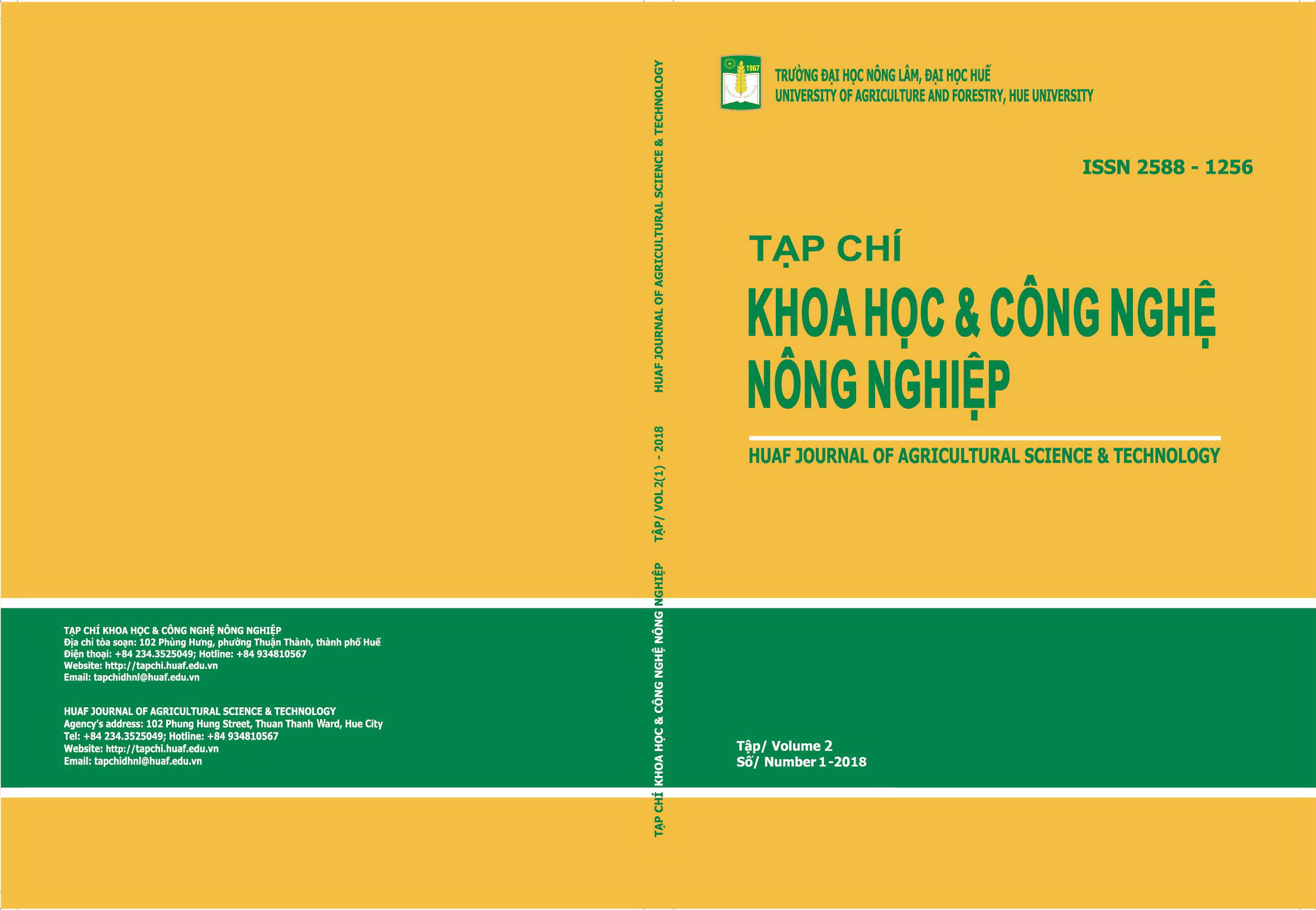##plugins.themes.huaf_theme.article.main##
Tóm tắt
Bằng kỹ thuật ngưng kết hồng cầu gián tiếp (IHA) và trắc định xê lệch ngưng kết gián tiếp chuẩn (SSIA), tình hình cảm nhiễm và miễn dịch chống virus dại ở chó tại ba xã nội đồng bắc Hà Tĩnh trước và sau đợt tiêm phòng dại nửa đầu năm 2014 đã được xác định. Tỷ lệ nhiễm dại tính chung hai đợt là 1,82% (N = 384), không khác biệt (P~0,34) giữa trước (1,12%, vào tháng 1 - 2) với sau đợt tiêm (2,43%, vào tháng 4 - 5), và lần lượt ở Xuân An, Xuân Giang và Xuân Mỹ là 1,56, 0,78 và 3,13%. Cũng không có sự khác biệt (P~0,22) giữa tỷ lệ nhiễm ở chó đực (2,69%) và cái (1,01%), cũng như ở chó dưới 1 tuổi (1,58%) với trên 1 tuổi (2,06%) (P~0,37) tuy không có chó dưới 6 tháng tuổi mang virus.
Sau đợt tiêm vaccine 21 ngày tỷ lệ chó được bảo hộ (≥4log2) tăng có ý nghĩa (χ 2 = 56,5/P~0) đến 83,33% từ 11,11%, cường độ bảo hộ (GMT) đến 19,397 từ 2,687 trước tiêm. Ngoài ra, thí nghiệm mẫu cặp trước-và-sau tiêm vaccine 21 ngày từ 39 chó cho thấy hiệu giá kháng thể trung bình tăng từ 3,54 lên 30,76 IHA, tỷ lệ chó được bảo hộ từ 7,7% lên 87,2%, với cường độ miễn dịch từ 2,346 lên 17,8.
Nghiên cứu cũng cho thấy số ít (2/39) chó dung nạp virus dại, và ngược lại, kháng thể đặc hiệu có sẵn trong máu không ảnh hưởng xấu đến đáp ứng vaccine.
SITUATION OF IMMUNE RESPONSES TO RABIES AND INFECTION PREVALENCE OF THE VIRUS IN THE FIRST HALF OF 2014 IN DOGS REARED IN THE NORTHERN PADDY AREA OF HATINH PROVINCE
ABSTRACT
With the techniques of IHA and SSIA the immune responses to rabies and infection prevalences of the virus in dogs reared in three paddy communes of the Northern area of Ha Tinh province in the first half of 2014 were determined. The average prevalence of rabies infection was 1.82% (N = 384), and no differences (P~0.34) between before (1.12%, in January and February) and after the campaign (2.43%, in April and May), and in respective Xuan An, Xuan Giang and Xuan My the rates were 1.56, 0.78 and 3.13%. There was also no difference (P~0.22) between virus prevalences in male (2.69%) and female (1.01%) dogs, as well as between dogs (P~0.37) of ages under (1.58%) and over one year (2.06%), although there was no infected one among dogs under 6 months of age. The rate of protected dogs (≥ 4log2) at 21 days after vaccination increased significantly (χ 2 = 56,5/ P~0) to 83.33% from 11.11%, with protection intensivity (GMT) reaching 19.397 from 2.687 before the compaign. Besides, experiments with paired samples before and at 21 days after vaccine injection from 39 dogs showed that average antibody titres increased from 3.54 to 30.76 IHA units, and protection dog rate increases from 7.7% to 87.2%, with immune intensivity increased from 2.346 to 17.8. This research also indicated that there were a few (2/39) dogs tolerated the virus, on one hand, and that available antibodies in blood did not affect the immune response of dogs to the rabies vaccine, on the other
